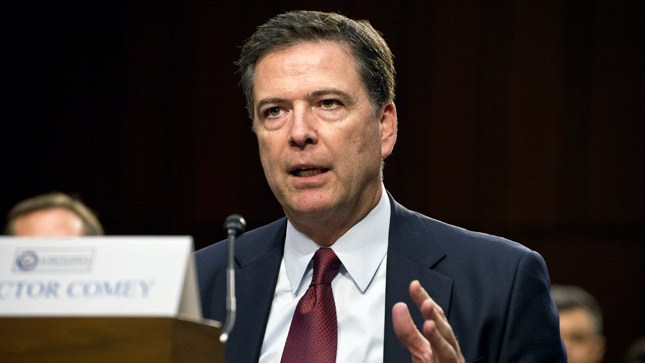By Dr Binoy Kampmark
“A man hears what he wants to hear
And disregards the rest.”Simon and Garfunkel, “The Boxer” (1970)
No one could say that Donald Trump has not made politics interesting. In so doing, he may well have distorted it, mangling its practice with ingredients of corrupting alt-reality. That same process has seen a distinct cheapening as well, but it could not be anything else.
Trump has revealed, within political practice, the virus that has afflicted it, the theatre that takes place from the White House, to Congress, to the Deep State. Life may be a stage, but Trumpland is a flickering pantomime, destroying any pretence of virtue in politics. There are only positions, opponents, and resolutions through bullying force.
The entertainment reality show got another instalment on Thursday with the testimony of former FBI director James Comey before members of the Senate intelligence committee. The various birds of prey wishing to find smoking carrion were left only partially satisfied. The Republicans were left confused, and the right wing media felt that Trump had been exonerated. There was something for everyone.
Comey did serve a few titbits, and in a political environment rich with conspiracy and assumption, these were converted into main courses. He did not, for instance, suggest that Trump was literally the subject of a counterintelligence investigation (go for the “satellites”, urged the former director), but garnished it with the following:
“As I explained, the concern of one of my senior leader colleagues was, if you’re looking at potential coordination between the campaign and Russia, the person at the head of the campaign is the candidate. So, logically, this person argued, the candidate’s knowledge, understanding, will logically become a part of your inquiry if it proceeds.”
As for those circling satellites, one stood out as a rich prospect on the Russian connection: the attorney general, Jeff Sessions. Comey’s testimony was notably slanted in that direction. His recusal from the Russia-link investigation in March pointed to a deeper connection.
Then, the old suggestiveness about special facts, the sort that revealed as much as it concealed: “I can’t discuss in an open setting that would make his continued engagement in a Russia-related investigation problematic.”
Whether the President’s plea on behalf of former National Security Advisor Michael Flynn to call of the dogs constituted an obstruction of justice was not something Comey wished to opine on. “That’s a conclusion that I’m sure the special counsel will work towards to try and understand what the intention was there and whether that’s an offence.”
The whole occasion played into a reality show that has assumed monumental proportions. Unwittingly, participants are playing to the Trump tune, following his direction. For one, the president could triumphantly claim that Comey had himself leaked, and deserved investigating himself. He may well have also lied, dangled Trump tantalisingly before the press corps, though he then claimed to have said nothing of the sort.
Trump also offered his “100 percent” willingness to testify under oath about his engagements with Comey to counter the former director’s claim. “I would be glad to tell him,” he said in the White House Rose Garden, “exactly what I told you.”
On cue, the impeachment brigades were also tossing a few confected ideas about, finding in the Comey revelations molehills fit for vast mountains. Democrat Representatives Al Green from Texas, along with fellow Texan Sheila Jackson Lee and Brad Sherman of California have stated that their scribes are working on articles of impeachment.
Green, however, has taken the enthusiastic lead, calling the act of firing Comey an “obstruction of justice”. “Obstruction of justice by the President is the problem. Impeachment by Congress is the solution.”[1] Green has been of such a persuasion from the start, and while he exudes principle on this score, he has already reached judgment on the matter. Constitutional lawyers, however, differ.
Green’s views received the backing of two anti-Trump resistance groups, MoveOn.org Civil Action and Invisible.[2] The executive of MoveOn did not “make this call [for impeachment] lightly” but it is hard to imagine anything not having an element of lightness when dealing with the relentless Trump vortex.
Invisible, having concluded that Comey’s testimony was ample, accurate and sufficient, felt that Trump had, in fact “tried to obstruct justice.”[3] Stating the obvious point that obstructing justice was impeachable, the organisation did not pause to consider that ethical abuse and legal manipulation straddles a grey area. But anger is the enemy of circumspection. “Impeachment takes time but we need to start the process now.”
Former ethics czar during the Obama years, Norm Eisen, provided another reading, claiming that the testimony was a “significant inflection point”. Leaked and hearsay evidence had existed before but “for the first time, we had direct evidence of obstruction of justice. It was a giant step towards accountability for Trump, but there will be many more giant steps necessary.”[4]
The emphasis should be on the sheer gigantic nature of those steps. In this postmodern theatre of competing views, each group stuck to their stubborn, already minted interpretations. Prior to the testimony, minds had already closed. Even Comey added a tantalising number to the tenor of the whole session, a nod to the Richard Nixon White House. “I have seen the tweet about tapes. Lordy, I hope there are tapes.”
Dr. Binoy Kampmark was a Commonwealth Scholar at Selwyn College, Cambridge and lectures at RMIT University, Melbourne. Email: bkampmark@gmail.com










